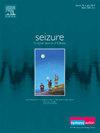Can Omega-3 fatty acid supplementation support the clinical management of drug-resistant epilepsy? A meta-analysis of randomized controlled trials
IF 2.7
3区 医学
Q2 CLINICAL NEUROLOGY
引用次数: 0
Abstract
Approximately 30-40% of individuals with epilepsy develop drug-resistant epilepsy (DRE), a condition associated with substantial socioeconomic and psychological burdens for patients and their families. As standard anti-epileptic therapies often prove insufficient, alternative treatments have become a critical area of research. Dietary interventions, such as the ketogenic diet, have shown promise, and emerging evidence highlights the potential role of omega-3 fatty acids, particularly docosahexaenoic acid (DHA) and eicosapentaenoic acid (EPA), due to their neuroprotective and anticonvulsant properties. However, the clinical application of omega-3 fatty acids for DRE remains uncertain due to limited high-quality randomized controlled trials (RCTs). To address this gap, we conducted a meta-analysis incorporating newly published RCTs to evaluate the clinical efficacy of omega-3 fatty acid supplementation as an adjunct to standard anti-epileptic medications in both children and adults with DRE. Our meta-analysis, incorporating high-quality RCTs, provides moderate-certainty evidence that omega-3 fatty acid supplementation, particularly at doses between 0.3 and 1.7 g/day, is associated with a reduction in seizure frequency in individuals with DRE. Notably, larger RCTs (sample size >30) demonstrated more consistent favorable outcomes. However, the evidence primarily reflects short-term effects, as the majority of included studies were of limited duration. These findings underscore the potential role of omega-3 fatty acids as an adjunctive therapy for DRE while highlighting the need for larger, long-term trials to better understand their clinical utility.
补充Omega-3脂肪酸能支持耐药癫痫的临床管理吗?随机对照试验的荟萃分析。
大约30-40%的癫痫患者会发展为耐药癫痫(DRE),这种疾病会给患者及其家庭带来沉重的社会经济和心理负担。由于标准的抗癫痫治疗往往被证明是不够的,替代治疗已成为一个关键的研究领域。饮食干预,如生酮饮食,已经显示出希望,新出现的证据强调了omega-3脂肪酸的潜在作用,特别是二十二碳六烯酸(DHA)和二十碳五烯酸(EPA),由于其神经保护和抗惊厥的特性。然而,由于高质量的随机对照试验(rct)有限,omega-3脂肪酸在DRE中的临床应用仍不确定。为了解决这一差距,我们进行了一项荟萃分析,纳入了新发表的随机对照试验,以评估补充omega-3脂肪酸作为标准抗癫痫药物在儿童和成人DRE患者中的临床疗效。我们的荟萃分析纳入了高质量的随机对照试验,提供了中等确定性的证据,证明补充omega-3脂肪酸,特别是0.3至1.7 g/天的剂量,与DRE患者癫痫发作频率的降低有关。值得注意的是,更大的随机对照试验(样本量为30)显示出更一致的有利结果。然而,证据主要反映了短期效果,因为大多数纳入的研究持续时间有限。这些发现强调了omega-3脂肪酸作为DRE辅助治疗的潜在作用,同时也强调了需要更大规模的长期试验来更好地了解其临床应用。
本文章由计算机程序翻译,如有差异,请以英文原文为准。
求助全文
约1分钟内获得全文
求助全文
来源期刊

Seizure-European Journal of Epilepsy
医学-临床神经学
CiteScore
5.60
自引率
6.70%
发文量
231
审稿时长
34 days
期刊介绍:
Seizure - European Journal of Epilepsy is an international journal owned by Epilepsy Action (the largest member led epilepsy organisation in the UK). It provides a forum for papers on all topics related to epilepsy and seizure disorders.
 求助内容:
求助内容: 应助结果提醒方式:
应助结果提醒方式:


